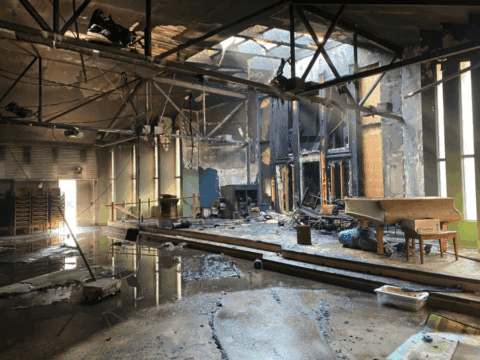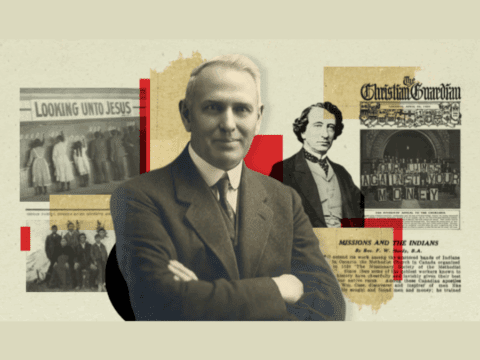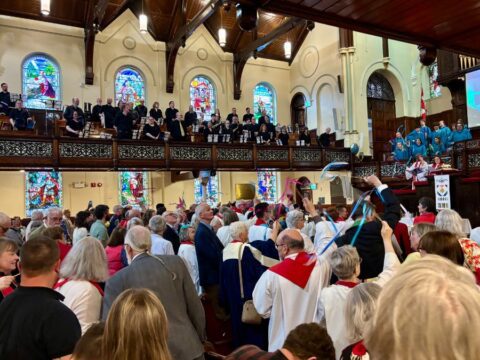Nearly 80 United Church ministry personnel have joined together to protest the General Council’s decision to offer testamur, ordination and commissioning to 200 designated lay ministers (DLMs).
The move would elevate DLMs to the same level of ministry as ordained and commissioned ministers, without the same level of education, according to the protest group which has dubbed itself Concerned Clergy.
The United Church’s General Council Executive has responded to the protest letter with a letter of its own, penned by Rev. Jennifer Janzen-Ball, the United Church’s executive minister of theology and ministry leadership. It addresses the clergies’ letter point by point.
The crux of the matter is the clergy group’s belief the move to offer ordination to DLMs is a workaround to an earlier remit — a church-wide vote — that proposed One Order of Ministry, a plan to offer ordination to DLMs. The remit was rejected in 2018.
General Secretary Rev. Michael Blair says the recent move is not a work-around. He says there had been a wide consultation within the church, including consulting the theological colleges, both before and after the remit.
Concerned Clergy first sent a letter to every United Church in Canada, explaining the upcoming changes. Next ministry personnel — including two past principals of Emmanuel College — signed a letter of protest to the church’s judicial committee — the court of last appeal in the United Church — followed by an appeal to that committee to stop the DLM plan. The judicial committee chose not to hear the appeal as they said it was not within their mandate.
Another letter of protest was sent to the GCE, outlining the clergies’ concerns and requesting to be added to the agenda of the GCE’s February meeting. The group was not added to the agenda; the GCE dealt with the protest letter as correspondence.
Among other concerns of the clergy is the speed with which the change was adopted. Group organizer Rev. Alison Miculan says, “It was done hurriedly and behind closed doors. The whole process was a fait accompli.”
The GCE made recommendations on DLMs at its September 2023 meeting. Related materials on the role of DLMs in the church were posted online prior to the October 2023 General Council, which ultimately approved the change, says Lori-Ann Livingston, public relations lead for the General Council office.
More on Broadview:
- This lay minister is helping the United Church create 100 new communities of faith
- United Church of Canada’s General Council to vote on church leadership strategies at this annual meeting
- How lay-led leadership could save rural churches
Other concerns are that the move “devalued ordered ministry personnel and nullified our credentials. This move is a blatant devaluing of the time, effort, education, curiosity and dedication of Ordered Ministers,” says Miculan.
In her letter, Janzen-Ball says the move does not devalue ordered ministers. “Lifting up one group of people does not diminish another. It enriches the whole,” she writes.
The clergy group also says allowing the General Council Office to grant testamur, as opposed to theological colleges granting it, in such numbers is unprecedented. The testamur is a document traditionally issued by a theological college to certify the candidate has successfully completed their course of study and is fit for ministry.
Janzen-Ball disagrees that testamur granted by the Office of Vocation would be the equivalent of handing out “unearned degrees,” as the clergies’ letter claims. She also notes that this testamur “applies solely to those who are currently DLMs and who are currently in the process of completing DLM training.” The current cohort in the DLM program will be the last of the graduates. From then on, anyone interested in pursuing ministry will do so through one of the theology schools, she says.
Rev. Ross Bartlett is the United Church formation director at the Atlantic School of Theology. He attached a signed statement to the protest letter.
“The decision regarding DLMs is quite troubling on two fronts. 1) It flies in the face of the clear resolve of the church through remit. 2) It appears to unilaterally redefine the historic meaning of testamur, which has always referred to learning, by now adding the possibility of length of service as a qualification.”
Ann Harbridge is a retired DLM who supports the move to ordain DLMs. “We have to deal with the issues of DLMs’ place in the church,” she says. “The current system is unjust, and DLMs are feeling undervalued and desperately need a pastoral response for these issues.”
Harbridge called the protesting clergies’ objections “a slap in the face. They insinuate that we are not educated, and I would challenge any minister to offer as good a ministry as I have.”
UPDATE: An earlier version of this story incorrectly stated that the church-wide vote proposing One Order of Ministry took place in 2022. In fact, it took place in 2015. This story has also been updated to include the General Council Executive’s recommendations from its September 2023 meeting.
***
Rev. Christopher White is a writer and United Church minister in Hamilton.
















“Lifting up one group of people does not diminish another. It enriches the whole,”
Maybe not. But it’s like giving everyone a trophy just for participating. Some clergy have sacrificed by giving years to being educated; getting their B.A. and their M. Div. and more , and then spent the next ten years or more repaying those loans and then participating in a process of continuing education because they knew they were “called” not by a congregation, but by God, to offer their gifts and knowledge to a spiritual community. To bestow on those less qualified the same status as those who have struggled for years in answering God’s call just doesn’t seem right.
Will the United Church reimburse those who spent more than $50,000.00 to get their degrees? After all if we’re all now going to be equal in status, shouldn’t the financial burden should be equalized as well?
In response to Sheldon
If we are called by God, I would want to follow what Paul wrote in 2 Corinthians 2:14-17.
I have always found Matthew 20:1-16 to really sting. What in life is fair? God does not reward us as the world does. If we do our ministry diligently without complaining, does He not appreciate that?
Matthew 6:26-34 – If we are in God’s favour, He will provide for us in all ways.
Not letting the congregates free, they are commanded to pay our “worth in salt”. ( 2 Corinthians 9; Hebrews 13:16; ! Corinthians 16:1-2)
Remember when they give, it is from the heart, not coerced or through emotional means.
You have a higher accountability as a Spiritual leader, and a double blessing. If your worried about what you or others are making, you lost sight of your calling.
Why is it we can repent for our contribution to residential schools but then national staff turn around and use the same threatening colonial language toward clergy who oppose a policy change?
I am embarrassed to admit that I am an ordained minister who does not know what testamur is. There were many problems regarding equality and equity in how our church deals with ministry on an institutional basis and as individuals. When I saw the names of many ministers that I know and respect on the list of signers, I realized I needed to consider their concerns more closely. I do not understand why GCE chose the path it did to work for equity for designated lay ministers. I would recognize Designated Lay Ministry as a valid stream of recognizable ministry without doing the testamur stuff.
I am a DLM who has been cleared for Ordination. To me, this is a justice issue for those of us who have been in ministry with Congregations for years. For nearly twenty years I have been a single minister in multi point congregations. I have been Chair of committees as well as President of Conference. I have taken courses and updated my education. I continue to grow and learn, as should all ministers, whatever their designation. Please note that when the last remit failed, it was NOT to Ordain DLM’s but to keep them in their designation but add them to Ordered Ministry. I am sure there is some regret among those Ordained who worked so hard to make sure the remit failed. I have always respected and received respect from my Ordained and Commissioned colleagues. We all have the same goal. I consider my call to ministry just as “good” as anyone’s and went through the same Discernment and Interview process with those who were being ordained, and was Recognized in a ceremony along with those being Ordained. I would never question anyone’s call from God. In a church where we practice inclusivity, I find it hard to understand those who can teach God’s love of all in the pulpit, and then spend so much time and energy against fellow ministers, who are doing the same thing. How can we be examples of Discipleship when we cannot even accept each other?
An M.Div. has always been required for Ordained Ministry. From 2012 – 2018 (Ordained, 2019), I drove from north of Parry Sound, ON to Emmanuel College (over 3 hrs each way if no traffic; over 4 with traffic) several times a week, leaving 4 children (5 – 11 years) with my husband, writing MANY well-researched papers which took me from family time to fulfill the 30 COURSE requirement. That journey was full of pain, but God Called me to Ordained Ministry and the Holy Spirit sustained me on those terrifying snowy drives north of Barrie on the 400. Like others, I came into the program with a graduate degree (M.A.- Queen’s University), but an M.Div. was REQUIRED for Ordained Ministry. Imagine how it feels to see that DLMs are having Ordination handed to them, with none of that work, in many cases none of the education, and none of the painful sacrifice of earning that essential degree. Some DLMs were grandfathered into THAT program, and are now being “Ordained”. A Vet Tech. does not become a Vet because of time served; a Dental Hygenist does not become a Dentist because of time served – they have to go to school to earn the credentials and education. Shame on this GC(E) for nullifying the credentials of Ordained Clergy who have worked so hard to preach, teach and serve this denomination so that people might know not ONLY that God is at work, but HOW God HAS BEEN AT WORK across time.
I received the call to ministry as a teenager; I argued with God that I was ‘just a girl.’ God didn’t seem to mind, and kept prodding me until I jumped off a twenty-year detour and decided to try lay ministry. I had been deeply involved in the church all my life and loved the United Church as family. I was accepted into the training program and began serving in rural ministry. I loved it and should have been content but felt called to be ordained, even though I had seen the prickliness of ordained folk toward my lay ministry counterparts. I went to St. Andrew’s. College and then understood the call: I felt like a starving person arriving at a banquet. However, I also saw the great value of my experience on Pastoral Charges, and knew that heart and love were more valuable tools to ministry than book-learning. I did not seek ordination for status, and I’m disappointed to see that word come up so often. It’s like arguing that gay marriage devalues heterosexual marriage, and I’m glad Jen insisted that raising up others does not take the ordained folks down. Have you not preached about Jesus and the Pharisees? Did you not notice that Jesus didn’t have the credentials they thought were important?
I’ve been to a lot of services in my life; I’ve seen the difference between leaders who cling to status and those who are truly spiritually fed and motivated. The least lovely communion service I ever attended was led by many-degreed senior ministers; I’ve seen CGIT girls with more sincere regard in rituals. I still feel more attracted to a DLM than to someone who wants status and respect because of their degree(s). In fact St. Andrew’s offered to up my BTh to MDiv and I couldn’t be bothered to apply for it.
I’m long retired now but still active and belong to a congregation with a DLM who is being ordained. It won’t change him in my eyes, even though my ordination was extremely important to me, and I get goosebumps thinking of going to the ordination service again. I hope that no DLM will be discouraged by the remarks of the 80 clergy who are protesting; we need their service in the church and should be very grateful to them and to God for their offered gifts!